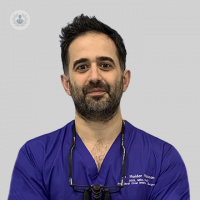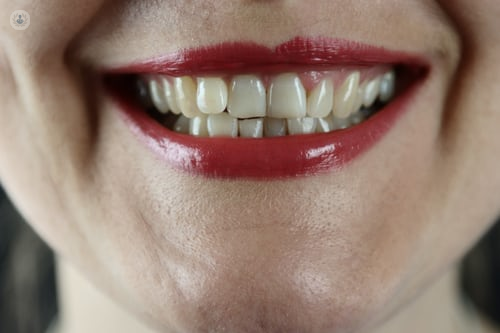
What are wisdom teeth?
Wisdom teeth are the third and last set of molars that people develop in their early teens or late twenties. There may be up to four wisdom teeth that grow on both the bottom and top at the back of the mouth. Wisdom teeth often affect other teeth when growing as the mouth becomes crowded and causes severe pain. When this occurs the only current remedy is having the tooth removed.
What is the purpose of wisdom teeth?
Wisdom teeth are evolutionary and were once essential to an early human diet of nuts, leaves, meat and roots. Yet today, we cook food to soften it and therefore wisdom teeth are no longer necessary. Some people may not even get their wisdom teeth coming through because humans have evolved past needing them. If they do not come through, however, it does not mean that they are not still there under the gum.
What are the symptoms of wisdom teeth growing in?
Symptoms of your wisdom teeth pushing through may include:
- Tender or bleeding gums
- Red, swollen gums that are enflamed
- Swelling of the jaw
- Bad breath
You should be able to notice that your wisdom teeth are starting to poke through your gums if you look at the back of your mouth using a mirror.
Do wisdom teeth always cause problems?
If there is enough room, the wisdom teeth can come through into a useful position without causing problems to any other tooth. There might be slight discomfort but this will disappear when it has grown fully into its place.
What is an impacted wisdom tooth?
An impacted wisdom tooth grows at an angle because there is not enough room for it to push through and it will be stuck against the tooth in front of it.
How can I relieve wisdom tooth pain at home?
It is recommended to use warm water with a little salt as a homemade mouthwash. Swish the saltwater around the tooth and try to get into the areas that your toothbrush cannot reach. An anti-bacterial mouthwash from your local pharmacy can also reduce the inflammation.
Pain relief medications such as Paracetamol or Ibuprofen can be used in the short term. If the pain is persistent then you should book an appointment to see your dentist.
What happens when wisdom teeth are removed?
If it is clear that your wisdom tooth is not able to come through into a useful position because there is not enough room, your dentist will recommend removing them. Or, if they have partly come through but are decayed, they may also be removed.
Your dentist will take an X-ray and explain how difficult it is or not with removing your wisdom teeth in your particular case. Often, upper wisdom teeth are easier to remove than lower ones, which are more likely to be impacted.
The dentist will determine whether the wisdom teeth should be removed at a dental practice or by an oral surgeon in a hospital. Usually, the routine procedure is performed under a local anaesthetic just as if you were having a filling, for example.
What should I expect after the procedure?
There is usually some swelling of the face and discomfort after having your wisdom teeth removed. It is best to avoid alcohol and smoking for a few days after the procedure. Your dentist will want to see you a week later to check how the mouth is healing and to remove any stitches.
02-04-2014 07-19-2023Wisdom teeth
Miss Katherine George - Oral & maxillofacial surgery
Created on: 02-04-2014
Updated on: 07-19-2023
Edited by: Aoife Maguire

What are wisdom teeth?
Wisdom teeth are the third and last set of molars that people develop in their early teens or late twenties. There may be up to four wisdom teeth that grow on both the bottom and top at the back of the mouth. Wisdom teeth often affect other teeth when growing as the mouth becomes crowded and causes severe pain. When this occurs the only current remedy is having the tooth removed.
What is the purpose of wisdom teeth?
Wisdom teeth are evolutionary and were once essential to an early human diet of nuts, leaves, meat and roots. Yet today, we cook food to soften it and therefore wisdom teeth are no longer necessary. Some people may not even get their wisdom teeth coming through because humans have evolved past needing them. If they do not come through, however, it does not mean that they are not still there under the gum.
What are the symptoms of wisdom teeth growing in?
Symptoms of your wisdom teeth pushing through may include:
- Tender or bleeding gums
- Red, swollen gums that are enflamed
- Swelling of the jaw
- Bad breath
You should be able to notice that your wisdom teeth are starting to poke through your gums if you look at the back of your mouth using a mirror.
Do wisdom teeth always cause problems?
If there is enough room, the wisdom teeth can come through into a useful position without causing problems to any other tooth. There might be slight discomfort but this will disappear when it has grown fully into its place.
What is an impacted wisdom tooth?
An impacted wisdom tooth grows at an angle because there is not enough room for it to push through and it will be stuck against the tooth in front of it.
How can I relieve wisdom tooth pain at home?
It is recommended to use warm water with a little salt as a homemade mouthwash. Swish the saltwater around the tooth and try to get into the areas that your toothbrush cannot reach. An anti-bacterial mouthwash from your local pharmacy can also reduce the inflammation.
Pain relief medications such as Paracetamol or Ibuprofen can be used in the short term. If the pain is persistent then you should book an appointment to see your dentist.
What happens when wisdom teeth are removed?
If it is clear that your wisdom tooth is not able to come through into a useful position because there is not enough room, your dentist will recommend removing them. Or, if they have partly come through but are decayed, they may also be removed.
Your dentist will take an X-ray and explain how difficult it is or not with removing your wisdom teeth in your particular case. Often, upper wisdom teeth are easier to remove than lower ones, which are more likely to be impacted.
The dentist will determine whether the wisdom teeth should be removed at a dental practice or by an oral surgeon in a hospital. Usually, the routine procedure is performed under a local anaesthetic just as if you were having a filling, for example.
What should I expect after the procedure?
There is usually some swelling of the face and discomfort after having your wisdom teeth removed. It is best to avoid alcohol and smoking for a few days after the procedure. Your dentist will want to see you a week later to check how the mouth is healing and to remove any stitches.

What does an oral surgeon do?
By Mr Josiah Eyeson
2024-11-21
Mr Josiah Eyeson is a leading oral surgeon specialising in the removal of impacted teeth and treating salivary gland disease. Find out what else these specialists do from an actual oral surgeon! See more
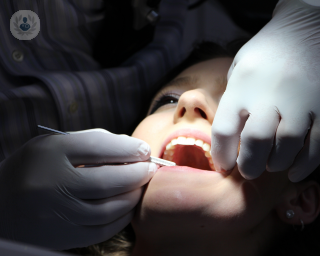

Wisdom tooth removal: how painful is it?
By Dr Ciro Gilvetti
2024-11-21
There’s a popular belief that wisdom teeth are painful and the removal of them is even worse. A lot of people are terrified when it comes to having their wisdom teeth removed. We asked Dr Ciro Gilvetti, a leading dentist in London, to put our minds at ease. See more
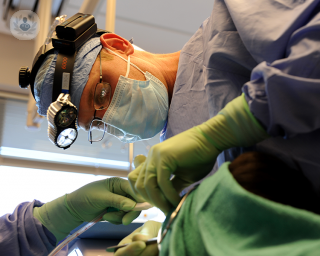

Wisdom teeth removal: How it works
By Mr Bhavin G Visavadia
2024-11-21
Not all wisdom tooth procedures are the same. Leading consultant maxillofacial and oral surgeon Mr Bhavin G Visavadia explains the difference between how simple and complex wisdom tooth removals are handled, and what recovery can look like. See more
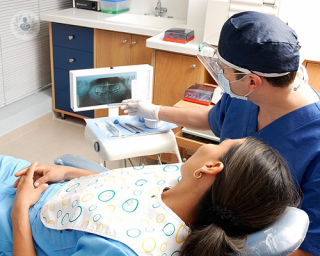

Warning signs of impacted wisdom teeth
By Mr Luke Cascarini
2024-11-20
You might be worried that at some stage you'll have to have your wisdom teeth out, but did you know it's not always necessary? We asked expert oral surgeon Mr Luke Cascarini when it's important to have them removed, and how dentists and specialists identify which teeth need to be removed. See more
Experts in Wisdom teeth
-
Miss Katherine George
Oral & maxillofacial surgeryExpert in:
- Facial reconstruction
- Facelift
- Salivary gland surgery
- Sialendoscopy
- Wisdom teeth
- Orthognathic surgery
-
Dr Haidar Hassan
DentistryExpert in:
- Oral surgery
- Dental implants
- Bone reconstruction
- Facial aesthetics
- Wisdom teeth
- Botulinum toxin (Botox™)
-
Mr Konstantinos Karavidas
Oral & maxillofacial surgeryExpert in:
- Head and neck cancer
- Salivary gland surgery
- Facial reconstruction
- Oral surgery
- Wisdom teeth
- Tongue tie
-
Mr Spencer Hodges
Oral & maxillofacial surgeryExpert in:
- Facial reconstruction
- Temporomandibular joint disorder (TMJ)
- Salivary gland surgery
- Wisdom teeth
- Skin cancer on face
- Neck lump
-
Mr Kunmi Fasanmade
Oral & maxillofacial surgeryExpert in:
- Oral surgery
- Wisdom teeth
- Mouth cancer
- Salivary gland surgery
- Neck lump
- Head and neck cancer
- See all

Forest & Ray - Dentists, Orthodontists, Implant Surgeons
Forest & Ray - Dentists, Orthodontists, Implant Surgeons
8F Gilbert Pl, London, WC1A 2JD
No existe teléfono en el centro.
By using the telephone number provided by TOP DOCTORS, you automatically agree to let us use your phone number for statistical and commercial purposes. For further information, read our Privacy Policy
Top Doctors

The Huddersfield Hospital - part of Circle Health Group
The Huddersfield Hospital - part of Circle Health Group
Birkby Hall Rd, Huddersfield HD2 2BL
No existe teléfono en el centro.
By using the telephone number provided by TOP DOCTORS, you automatically agree to let us use your phone number for statistical and commercial purposes. For further information, read our Privacy Policy
Top Doctors

The Harborne Hospital - part of HCA Healthcare
The Harborne Hospital - part of HCA Healthcare
Mindelsohn Way, B15 2FQ
No existe teléfono en el centro.
By using the telephone number provided by TOP DOCTORS, you automatically agree to let us use your phone number for statistical and commercial purposes. For further information, read our Privacy Policy
Top Doctors
-
Forest & Ray - Dentists, Orthodontists, Implant Surgeons
8F Gilbert Pl, London, WC1A 2JD, Central LondonExpert in:
- Braces
- Porcelain veneers
- Crowns
- Cosmetic dentistry
- Dental implants
- Orthodontics
-
The Huddersfield Hospital - part of Circle Health Group
Birkby Hall Rd, Huddersfield HD2 2BL, HuddersfieldExpert in:
- Acupuncture
- Hip
- Cardiology
- Shoulder surgery
- General Surgery
- Maxillofacial Surgery
-
The Harborne Hospital - part of HCA Healthcare
Mindelsohn Way, B15 2FQ, BirminghamExpert in:
- Digestive
- Cancer
- Orthopaedic surgery
- Thoracic Surgery
- Diagnostic Imaging
- Obstetrics and Gynaecology
- Most viewed diseases, medical tests, and treatments
- Migraine
- Head and neck cancer
- Neck lump
- Acellular dermal matrix (ADM)
- Prepectoral breast reconstruction
- One Stop Breast Clinic
- Botulinum toxin (Botox™)
- FUE hair transplant
- Carpal tunnel syndrome
- Platelet-rich plasma

